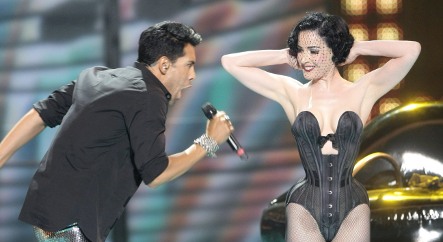German duo Alex Swings Oscar Sings! earned 20th place out of 25 countries, despite the titillating appearance of US burlesque star Dita von Teese on Saturday night in Moscow.
Public broadcaster ARD, traditionally responsible for nominating the country’s Eurovision contestants, told Hannover daily Neue Presse that German organisers were deeply disappointed by the poor showing.
The humiliation in front of some 120 million European viewers was “not the result we hoped for,” ARD coordinator Thomas Schreiber told the paper, adding that “in the coming year, we must think radically different.”
After 2008’s dismal last-place performance by girl group No Angels, this year’s contestants were chosen using a new method – a secret ballot competition by ARD’s regional broadcaster NDR instead of letting viewers choose via televoting.
But head of fan organisation Eurovision Club Germany, Dr. Michael Sonneck, told The Local that German Grand Prix enthusiasts had been disappointed with the duo, which included a German “porno techno” producer and musician and an American Broadway performer.
“We hoped for a better choice,” Sonneck said of the lascivious strip tease accompanying the swing-pop song “Miss Kiss Kiss Bang” on Saturday evening. “They chose people who were not well-known and then the Dita von Teese performance probably damaged their result more than it helped.”
ARD may be considering a new partnership with private broadcaster ProSieben’s moderator and successful music producer Stefan Raab for the 55th annual Eurovision Song Contest next year, daily Süddeutsche Zeitung reported on Monday.
Raab already has Eurovision experience, having won a respectable fifth place in 2000 with his jokey song Wadde Hadde Dudde Da, in addition to composing a seventh-place song in 1998 and an eighth-place song in 2004. Raab would likely return the selection process to a televised contest based on viewer calls.
“It’s hard to say what the ideal concept for choosing the contestant would be,” Eurovision Club Germany’s Sonneck told The Local. “But it should certainly be something that includes the viewers – as long as the voting is fair.”
Germany hasn’t won a Eurovision competition since 1982, and Sonneck said he wasn’t sure if German musical taste failed to resonate with other European countries.
“This year’s group, which included an American, certainly wasn’t typically German anyway,” he said. “Though I certainly wouldn’t want to send German folk music to the next contest either.”
A 23-year-old Norwegian, Alexander Rybak, won Saturday’s contest in Norway’s third victory by singing a rousing love song accompanied by his violin. Known as a Norwegian Harry Potter look-alike, Rybak was born in Belarus but grew up near Oslo.
Despite Germany’s pasting this year, Sonneck said that he and other club members were pleased Rybak ended up as the winner.


 Please whitelist us to continue reading.
Please whitelist us to continue reading.
Member comments